|
I first met English teachers from Cuba when Adita Chiappy
President of GELI (Grupo Especialistas en Lengua
Inglesa), the Cuban TESOL affiliate, and her late husband Tony
Irizar, President of the Linguistics Association of Cuba, spoke at the TESOL Amigos de Cuba Forum at the International TESOL Convention in
2012. Their talk was mesmerizing. Due to the U.S. policy of an embargo
on Cuba, it was not easy for Adita and Tony to get visas to attend and
while they had attended a TESOL convention in the mid 80s –it had taken
years before they were able to obtain visas and gain sponsorship to
attend again. Their presentation filled me with hope in the power of
international exchanges of English teachers at the face to face,
grassroots level. There was so much interest on the part of us in the
audience at that forum—from those who had already visited Cuba to those
who like me who had never gone to Cuba before.
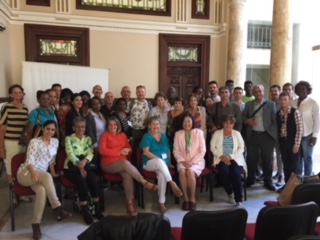
Group photo: 23rd A
group of attendees from the GELI Convention gather together in Havana,
Cuba, December 14-16, 2017.
While I had never gone to Cuba, I had had a long standing
interest in Cuba and was eager to go. As an undergraduate student I had
read many books about the Cuban revolution in 1959 against Batista
(Zeitlin, 1970) and was inspired by their literacy campaigns and their
medical doctors and health care system. One of my cousins and a number
of friends visited Cuba as part of the Venceremos Brigade—a group of
young people from the U.S. who had gone to Cuba to cut sugar cane. I
have also been interested in race, politics and identity in Cuba from
Chinese to LGBT to Afrocuban literature, music and culture (Perez Sarduy
& Stubbs, 1993). At the Amigos de Cuba Forum, Adita and Tony
spoke about the history of TESOL methodology and English Language
Teaching in Cuba since the 1960s and described the challenges they faced
when many of the English professors left Cuba as well the challenges in
gaining support for their work of doing outreach to English teachers in
rural areas (Irizar Valdes & Chiappy Jhones, 2012). Due to the
problems between the U.S. and Cuban governments in obtaining visas, in
gaining support to travel and the embargo between the U.S. and Cuba
their attendance at the International TESOL Convention was an
extraordinary achievement—they were truly ambassadors.
In 2016 many of us in the U.S. were encouraged when President
Obama traveled to Cuba, hoping that there would be a lifting of the
embargo on trade between the two countries as well as lifting of
restrictions on tourism and travel. However, in June of last year,
President Trump announced a reversal of Obama’s policy and called for
increased restrictions on travel (Merica, 2017). When the call came out
for the 23rd Annual Cuban English Language
Specialists conference of GELI (Grupo Especialistas en Lengua
Inglesa), the Cuban TESOL affiliate, in Havana December
14-16th, my colleague Dr. Rachel Grant from City
University of New York Staten Island and I were eager to go.
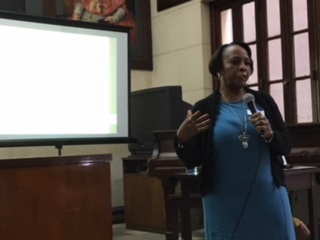
Dr. Rachel Grant, City University of New
York- College of Staten Island, delivered an insightful
plenary.
The theme of the conference was “Keys to professional success”
and in plenaries and conference papers a number of common themes
emerged. Dr. Luis Mijares Nunez from the Rafael Ma. de Mendive
University delivered a plenary address “Oral Communication Strategies
and a Comprehensive Education.” I was particularly struck by his
insistence that as educators we have a social and moral responsibility. I
saw many parallels between his approach to pedagogy and philosophical
stance and between Rachel Grant’s plenary on assessment and my own talk
“Dialogic Approaches to Teaching to the Whole Person” to address the
needs of the learners where they are and to see the intergenerational
responsibility of more senior professors and teacher educators to model
transformative pedagogy and serve as an example and to mentor and
promote the leadership of younger generation teachers—teaching to the
whole person goes beyond teaching knowledge, but it also encompasses
caring for emotional, artistic and ethical growth and development.
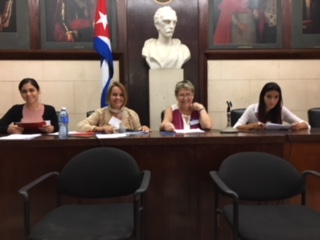
From left to right: Rosa M. Jordan School of Foreign
Languages, University of Havana; Mariam Lopez, Prof. Pedagogical
University, President Adita Chiappi; Patricia Sanchez Penabad, Professor
of English and Student at the Pedagogical University deliver an
engaging panel at the conference.
A number of presentations addressed the teaching of grammar.
Maria de la C. Smith Batson and Dr. Elvira Alonso Hernandez from the
University of Las Tunas focused on principles of profession orientation,
focusing on oral interaction. Armando Hernandez Vizoso and Azel Gari
Dias from MSc. Pedagogical University presented activities on the
present perfect based on innovative analysis of the semantic and
pragmatic uses of the present perfect. Julian Hernandez Angulo, their
professor from JSc Pedagogical “Enrique Jose Varona” presented on lesson
planning. Presenter after presenter took up the importance of being
open-minded, flexible, reflexive and collaborative. One conference
participant shared, “In my opinion, the most important keys for a
teacher--of any language and of any subject-- is to be ready for
learning throughout life, and doing so aiming at the satisfaction of the
students’ needs, and not at your own wish to know more.” Others
discussed interdisciplinary approaches, creativity and respect for
diverse points of view. It was also encouraging for me to meet others
from Cuba, Canada and the U.S. who shared a commitment to further
international educational exchanges, particularly at the grassroots
level-- classroom to classroom, school to school and university to
university. I came away enriched by conference participant insights and
invigorated in learning about more international and global perspectives
to social justice.
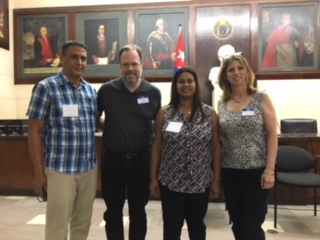
Edwardo Escalona Pardo, Peter
Ruffner, Pantoja Tamayo and Gloria Ward collaborate together on their
upcoming projects at the conference. (For more on their work see this article.)
I was struck by the hospitality of the conference organizers
who had very little in material resources but made up through
flexibility, creativity and organization. For example, they had one
projector to project slide shows and had to borrow another for the whole
conference. And in the business meeting it was put forward that the
proceeds from the conference would go towards purchase of a new
projector for GELI. The elevator in one of the buildings we met in was
not in service and the staircase was not handicap friendly. None the
less, students cheerfully assisted me by carrying my bags and taking my
arm up step and down stairs with my arthritic knees. One conference
attendee Dr. Vilma V Borrero Ochoa presented a paper for a colleague who
had had a family emergency and could not attend. She had memorized his
presentation on Sociocultural Features in English Language Teaching as
well as her own on guiding student research. When we had the opportunity
to have lunch together she shared with me that she became blind as a
mature adult in recent years. Initially the adjustment to losing her
sight made her want to retire from teaching, but her colleagues went to
her home and insisted that she come back and encouraged her to continue
to teach!
Another example of commitment to the profession and deep desire
for professional development and collaboration was the commitment of
the Cuban affiliate members who did not live in Havana to make
sacrifices to attend the conference—especially those from rural areas
who had to travel great distances. I spoke to professors who had taken
long bus rides—10-12 hours to attend the conference. Those who did not
have relatives or friends to stay with in Havana might travel all night
to make their presentations and then return after one day to safe on
hotel stays. More than one Cuban professor emphasized “perseverance” and
“exchange and collaboration” with colleagues and professionals from
other areas. Another spoke of the need to “do research on those topics
out of our comfort zone in order to master them.” In personal
conversations and formal presentations many made reference to getting to
know the specific needs of their students. Another key to profession
growth that was echoed throughout the conference was self-study,
including observing your own ways to teach, reflections on our praxis.
This is enhanced through collaboration, including peer observation, and
collaboration in seeking feedback on the needs of students—not only
academic needs but as human beings.
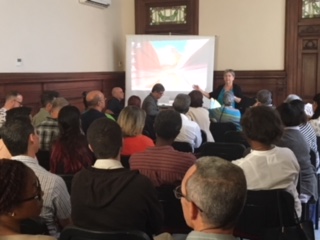
President Adita Chiappi addresses the closing session.
I left this conference determined to encourage other TESOLers
to consider attending a future English conference in Cuba as well as to
consider ways we as international colleagues can redouble our efforts to
overcome Muslim bans, travel bans and to facilitate more professional
collaborative projects with TESOL affiliates for international exchange
around the world.
References
Merrica, D. (2017) Trump unveils new restrictions on travel,
business with Cuba. CNN. http://www.cnn.com/2017/06/16/politics/trump-cuba-policy
/index.html
June 17, 2017.
Irizar Valdes, T & Chiappy Jhones, A. (2012)
Teaching English in difficult circumstances. Approach:A Journal
of English Language Teaching in Cuba. 12, 28-33.
Perez Sarduy, P. & Stubbs, J. (1993) Afrocuba: An
anthology of Cuban writing on race, politics and culture. Melbourne
& New York: Ocean Press.
Zeitlin, M. (1967) Revolutionary politics and the
Cuban working class. Princeton, NJ: Princeton University
Press.
Shelley Wong is a member of the Mason DREAMers advisory board at George Mason University in Fairfax, Virginia. | 
